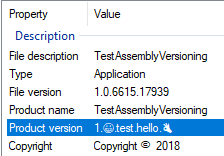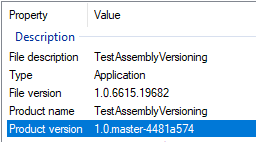Versioning Assemblies with Cake and Git
Requirements
- Given an application, I want to be able to trace its binaries back to the source code “version” it was built from;
- As such, I want this identification ability to be automatically employed during the build process;
- I want to have easy ways of retrieving this information, as well as the version of code it was built from;
- All files built at the same time have the same version;
- I use git for VCS and Cake for build scripts;
- I don’t want trivial commits, such as those containing only the identifying information.
Proposed solution
- Employ a way of versioning (duh) that is tied to individual files;
Satisfies requirement 1; - Include the git branch information;
- Include the commit id (SHA1) of the
HEADas a way of identifying the exact state of the code;
Satisfies requirements 2 and 5; - Only built from committed code (no uncommitted files);
Satisfies requirements 2, 3, and 4; - If files are modified for versioning purposes,
roll back the changes at the end of the build, even if the build had errors;
Satisfies requirement 6.
Technical Details
As far as the versioning goes, there are several version numbers associated with a .Net assembly:
- Assembly version, important to the .Net loader - set with
AssemblyVersionattribute: usually inProperties/AssemblyInfo.cs.
Must be in major.minor.build.version format, all numbers, or the compiler throw aCS7034error:error CS7034: The specified version string does not conform to the required format - major[.minor[.build[.revision]]]
- File version, a property of the file itself and inspect-able in the Details
section of the file properties dialog is set using the
AssemblyFileVersionattribute.
There’s a warning, but not an error (unless we have\<TreatErrorsAsWarnings>true\</TreatErrorsAsWarnings>, which we should), if we don’t follow the same format as the assembly version:warning CS7035: The specified version string does not conform to the recommended format - major.minor.build.revision
- Product version is another property of visible in the file properties dialog,
is set using the
AssemblyInformationalVersionattribute, and is the most permissible of the three as it literally accepts any string, although we should set it to something reasonable and meaningful to whomever inspects it.
This Stack Overflow answer, and the ones that follow, provides really good descriptions of each attribute, its limitations, and intended use.
Because we want to include the branch name and the commit id (SHA1),
the AssemblyInformationalVersion is the only we can use.
We propose the following format: Major.minor.branch-sha1.
The assembly version can be dynamically versioned by MSBuild using
the format [assembly: AssemblyVersion("1.0.*")] as a way of providing
supplemental information about the date and time of build -
see the Remarks section of the AssemblyVersion docs.
Implementation
We’ll make use of the Cake.Git add-in and Cake’s ability
to generate the assembly information using CreateAssemblyInfo method.
To simplify matters, we’ll split AssemblyInformationalVersion attribute
from the Properties/AssemblyInfo.cs file into its own
Properties/AssemblyInfoVersion.cs. Its content is unimportant,
but we’ll start with a value of:
[assembly: System.Reflection.AssemblyInformationalVersion("1.0.0.0")]
Next we’ll create a Task("Version") in our build.cake file that
creates the AssemblyInfoVersion.cs file, we’ll make the Build
task depend upon it, and we’ll revert the changes at the end of
the build process.
#addin nuget:?package=Cake.Git
var configuration = Argument("configuration", "Debug");
var thisRepo = MakeAbsolute(Directory("./"));
var assemblyInfo = File("./TestAssemblyVersioning/Properties/AssemblyInfoVersion.cs");
Task("Version")
.Does(() =>
{
var branch = GitBranchCurrent(thisRepo);
// The following is not the best approach
// We should use LibGit2Sharp's ObjectDatabase.ShortenObjectId(),
// but Cake.Git doesn't currently support it.
var sha = branch.Tip.Sha.Substring(0, 8);
// TODO: branch.FriendlyName produces a name too long when using gitflow,
// e.g. "1.0.12fa582d-feature/MYPROJ-2732-title_of_story_or_defect".
// There should be an attempt to extract maybe the issue identifier
// so that we end with something like "1.0.12fa582d-MYPROJ-2732"
// or "1.0.12fa582d-f-title_of_story"
CreateAssemblyInfo(assemblyInfo, new AssemblyInfoSettings {
InformationalVersion = string.Format("1.0.{0}-{1}", branch.FriendlyName, sha)
});
});
Task("Build")
.IsDependentOn("Version")
.IsDependentOn("Restore-NuGet-Packages")
.Does(() =>
{
if(IsRunningOnWindows())
{
MSBuild(sln, settings => settings.SetConfiguration(configuration));
}
else
{
XBuild(sln, settings => settings.SetConfiguration(configuration));
}
})
.Finally(() =>
{
// restore assembly.cs files
GitCheckout(thisRepo, new FilePath[] { assemblyInfo });
});
That’s it. Now every time we build the project using our build script, the product version will reflect it accordingly:

Note 1: if we had multiple assemblies, like normal projects do,
we would have a single AssemblyInfoVersion.cs, likely in the root of the project,
and we would link that file into each project to ensure they all get
the same product version:
<Compile Include="..\AssemblyInfoVersion.cs">
<Link>Properties\AssemblyInfoVersion.cs</Link>
</None>
Note 2: it seems reasonable that we should maybe perform a check to see if all changes have been committed before the build, otherwise the build would incorporate the changes on disk while still picking up the HEAD SHA1.